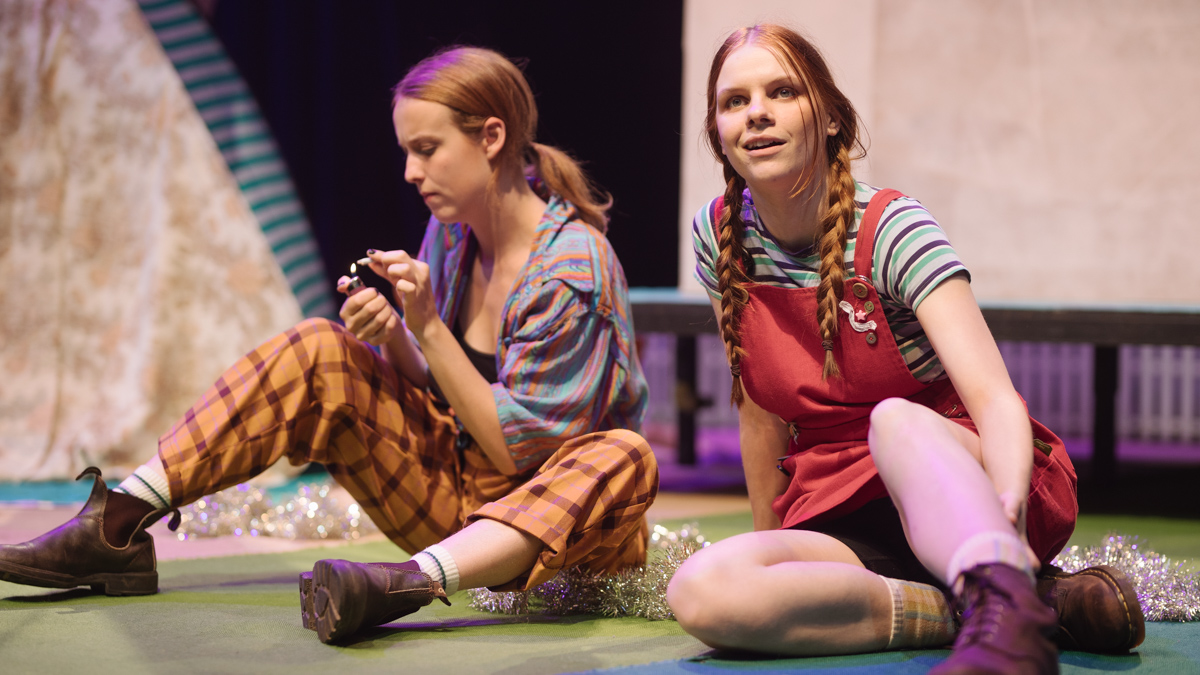As its name suggests, Lemon Tree on Dreg Street is zesty, full of flavour and surprisingly sweet.
Twiglet ‘Twigs’ and Boots are 20-something besties who live at Twigs’ now-dead mum’s place, number 101 Dreg Street: a boho haven of warmth and youthful energy – but sadly, nothing can stay the same forever.
A sign in the front tells us the house has recently been sold, courtesy of Vulture Real Estate, and the colourful pop-up book house and its cast of Playschool-bright characters will be moving on – Boots to find Stonehenge in Ireland (where she thinks it is), and Twigs on her new journey, as yet to be determined.
But before everyone leaves – a wedding is on the cards. Possum Lady, an itinerant woman who has taken up residence in a tent at Dreg Street, has fallen in love with the huge lemon tree in the front yard – and they are getting married.
If it sounds crazy, well, it is. But in the best possible way. Written by Melbourne-based queer and neurodiverse writer Amy May Nunn, the script is just so good.
The rollicking, offbeat story is full of heart and hilarity – proper laugh-out-loud moments that descend into aching pathos. Props go to any story that can wring such emotion from a wedding between a person and a tree.
It reminded me a bit of the 2007 film Lars and the Real Girl, where Lars falls in love with a blow-up doll, believing she is real. Similarly, in Lemon Tree on Dreg Street, the pathos is derived from the people around Possum Lady, who accept her unconventional love, and go along with it – a powerful symbol of unconditional acceptance, underneath the seemingly bananas storyline.
Directed by Melbourne-based director, writer and choreographer Miranda Middleton, Lemon Tree on Dreg Street, also brings the audience into the story: as Twigs and Boots climb the stairs of the seating bank to adorn the rails with bunting, yelling their lines over the top of the audience, as actors direct asides at audience members and, for the wedding, where some punters are taken down to sit on the stage alongside the cast – we see the world from the inside. Coaxed through the Playschool window, we see anew the madcap world of the play becoming less topsy-turvy as our vision is righted.
The world of Twigs and Boots is brought to life by Casey Harper-Wood’s brilliant set and costume design, which feels as if we’ve stepped into a children’s television show: bright colours, the house a 2D cut-out and a lemon tree made of colourful ropes, yellow balloons and crepe paper, and covered with festoon lighting.
Milk crates and broken camping chairs conjure the sharehouse vibes. It’s theatrical and fun and fits the playfulness of the story. Moreover, as in children’s TV, we are asked to use our imagination: to accept that this suspended craft project is a lemon tree, and to accept that Possum Lady can and will marry it.
I mean, when life gives you lemons, why not marry them?
Middleton has assembled a cast of incredibly talented comic actors and, under her assured direction, they are a wonderful example of an ensemble cast working together well.
The core duo of Hayley Edwards’ Boots and Ayesha Harris-Westman’s Twigs are a convincing pair of known-each-other-forever besties, as equally comfortable curling up together as they are taking the piss out of each other – with the deeper love connecting the two acting as one source of the play’s crisscrossing threads of underlying tension.
Milo Hartill plays three characters in the play – the whimsical sign-writing neighbour, Marge; the cow-loving celebrant and Twigs’ love-interest, Cowgirl; and the Executioner (I’ll say no more). Her natural sense of comic timing is a delight and some of the biggest laughs in the play come from her wringing all the funny juice out of the script.
Alex Donnelly’s Vulture – the high-heeled-platform-wearing, teal-suited, feather-epauletted (what an incredible costume) and mustachioed real estate agent – is a winning character, performed with the right mix of bravado and vulnerability. Initially a symbol of corporate greed and the villainy of modern property development – his falling apart personal life endears him to the Dreg Street crew, and he’s invited into participate in the wedding.
Michelle Perera’s cut-off shorts and singlet-wearing Possum Lady is played with no-nonsense brusqueness, and – despite what felt like a few line-cue timing errors on opening night, which I’m sure will be ironed out – is a great foil for some of the other more whimsically oddball characters.
There are a couple of songs in the play, written by composition and sound designer, Oliver Beard, which provide for real standout moments. The scene where Boots, Twigs and Cowgirl sing together, harmonising as Boots awkwardly plays the keyboard, is surprisingly moving (in what could easily be twee). It feels as if this show could even lean further into its wild kiddie-show vibes and have another life as a musical.
Lemon Tree on Dreg Street, for all its wackiness, is a story about the inevitability of change, wrapped in an enormously entertaining, zany comedy, full of a variety of colourful crayon-hued characters, all managing their own demons and learning to grow up.
Read: Performance Review: Lesbian Love Stories
While the ending could do with some tightening (I felt as if it ended maybe three times), Lemon Tree on Dreg Street is a real delight, a heap of fun and you’d be hard-pressed not to fall just a bit in love with its residents.
Pop it on your list this Midsumma, I double-dare you.
Lemon Tree on Dreg Street by Amy May Nunn
Theatre Works, Melbourne
Director: Miranda Middleton
Cast: Ayesha Harris-Westman, Veronica Pena Negrette , Michelle Perera, Alex Donnelly, Hayley Edwards, Milo Hartill
Producer: Danielle Goder
Set and Costume Design: Casey Harper-Wood
Lighting Design: Aron Murray
Composition/Sound Design: Oliver Beard
Stage Management: Brigette Jennings
Tickets: from $22
Lemon Tree on Dreg Street will be performed until 4 February 2023 as part of Midsumma Festival.





